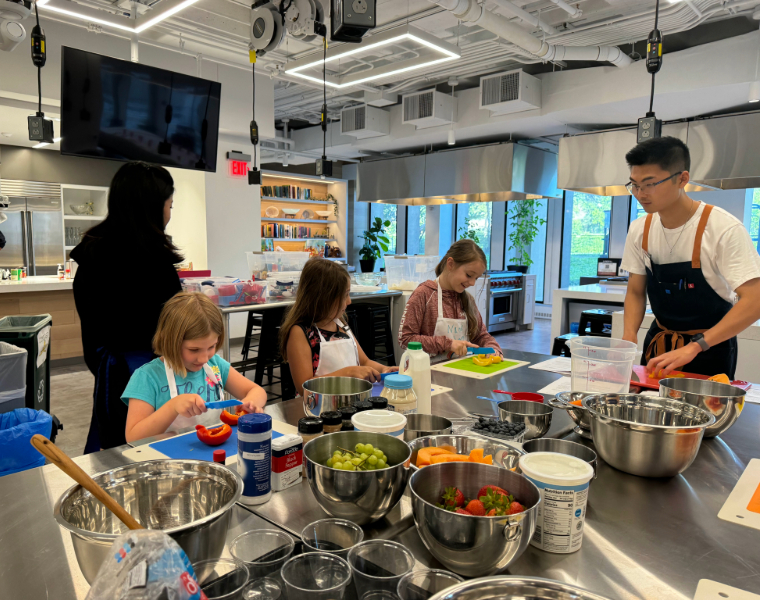
Managing Type 1 diabetes (T1D) can often feel overwhelming-and that's especially true for children and their caregivers. That's where Case Western Reserve University's Diabetes Inspired Culinary Education (DICE) study comes into play, offering a new way to approach T1D care and education.
Led by Catherine McManus, the principal investigator for the study and assistant professor at the School of Medicine, DICE is designed to help families with children aged 8 to 14 who are considered at higher risk due to poor glycemic control. The study doesn't just target children; it involves their entire families in an interactive, supportive environment aimed at fostering better T1D management.
A key factor in the study's success has been the contributions of CWRU students, who serve as DICE student research assistants. Students have hands-on roles in the program, helping to deliver engaging lessons in CWRU's teaching kitchen, a 2,300-square-foot state-of-the-art facility that opened in 2023.
A tailored approach
Funded by the American Diabetes Association, the DICE program is an evidence- and theory-based behavior change intervention, aiming to set new standards for diabetes control.
"T1D management really involves and engages the entire family," McManus explained.
That philosophy is at the heart of DICE. Families are invited to bring up to three additional members to the program's educational sessions, which reinforces the idea that diabetes care is a shared responsibility.
The study follows a waitlist randomized controlled trial design, ensuring all participants receive the program's benefits. After an initial data collection in February, families are either placed in a spring intervention group or a summer waitlist control group.
"We felt it would be unethical to withhold the educational programming from families assigned to the control group, so we designed the study to ensure everyone participates," McManus noted.
The study's first cohort finished in 2024, and DICE's second and last cohort is getting ready to kickoff within the next few months. Participants were recruited through partnerships with Rainbow Babies & Children's and Cleveland Clinic children's diabetes clinics, the Michigan and Northern Ohio Chapter of Breakthrough T1D via mailings and community events like the T1D Walk at Cleveland Zoo, and Camp Ho Mita Koda through their T1D-focused events.
Each cohort completes 10 weekly lessons in CWRU's teaching kitchen. The lessons, held over the dinner hour, provide an engaging mix of child-focused, caregiver-focused and family-wide education.
Learning by doing
The study's hands-on approach is a standout feature. Children are divided into two age groups and participate in interactive cooking lessons, learning skills such as cracking eggs, chopping vegetables and using meat thermometers.
"The children prepare the foods they'll eat during the family meal," McManus said. "At the same time, they're learning about nutrition, T1D management, and food safety in a way that's both fun and practical."
While the kids are cooking, caregivers engage in discussion-based sessions led by a registered dietitian specializing in pediatric T1D. They share experiences, discuss challenges and explore solutions together.
After separate sessions, families reunite for a shared meal-one they've helped prepare. The group meal serves as a practical demonstration of healthy eating while reinforcing lessons learned during the session.
"We're all going through the same thing with trying to manage our child's TID and it was really nice to have other parents to talk to about challenges we face and how to overcome them," noted one parent from the first cohort. "It was also nice for the kids to open up with each other because I know sometimes they struggle in school and other social situations."
Impact beyond the kitchen
The study's benefits extend well beyond the lessons themselves. By integrating practical skills with education, DICE aims to empower families to make lasting changes in how they manage T1D-and equip students with invaluable experience in patient care, teaching and community engagement.
For Maggie Storti, a graduate student pursuing a Master of Science in Public Health Nutrition, participating in the DICE study has been a transformative experience. Storti was an undergraduate student on the DICE research team in 2024 and is continuing her role as a researcher during her graduate studies.
"Near the end of the first cohort, two young participants came up to me while I was prepping for the next week's lesson," Storti recalled. "They sat with me, watched as I edited lesson plans, and even begged to know what food we'd be making next week. Before they left, one of them gave me a hug and said, 'Thank you for making this so fun. I can't wait for next week.' That moment reaffirmed that we were making a real difference."
As DICE gears up for its second cohort, McManus and her team are collecting data to evaluate the program's impact. One thing is already clear: DICE is changing lives by making diabetes care a family affair-one meal, one lesson and one step at a time.






